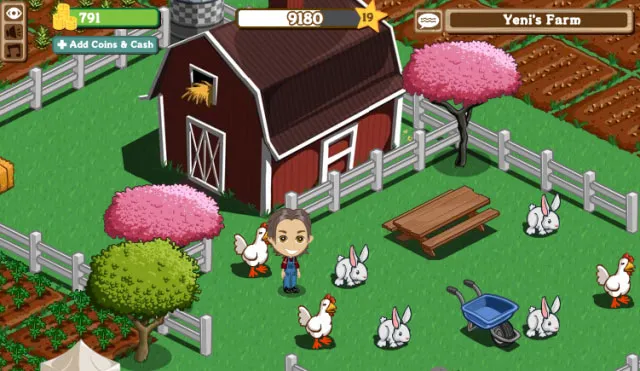In millions of offices and homes around the world, people are hard at work planting crops, feeding cattle and tilling their land. Welcome to Farmville, the digital rural world where the sun always shines, where beans take two days to grow, where pink cows produce strawberry milk, where farming is leisure.
Farmville has become a viral Internet trend since its launch as a Facebook application in 2007. According to Zynga, the company that brought FarmVille into the world, it has rapidly grown to over 70 million users – compare that to the one million traditional farmers active in the USA.
Players sign up and get fields, infrastructure, and cash. Their task is to create bigger, better, and richer farms. The game starts off with a given piece of land and seeds that can be planted, harvested and sold for online coins. As you make money, you can buy things, from basics like pumpkin seeds and chicken to the truly superfluous, like elephants and hot-air balloons.
Impatient players can use credit cards or a PayPal account to buy more assets, although purists tend to disapprove on the practice and constrain themselves to developing their farm through simple ‘labor’.
Farmville remotely reminds of the addictive Tamaotchi pet toy, but instead of feeding a little ‘animal,’ you’re caring for a digital farm with insatiable livestock and crops that need regular clicking. Crops must be harvested in a timely fashion, cows must be milked, and social obligations – like exchanging gifts and fertilizing your neighbor’s pumpkins – have to be met.
The virtual farming provides an odd mash–up of social networking with rural nostalgia. In comparison to the often violent world of gaming, Farmville with is emphasis on creation, cooperation and strategy represents a form of virtual country calm that transports us somewhere else for a minute or an hour. In doing so, the game taps deep into the human psyche, and the longing for an idyllic agrarian past that has long gone.
For the larger part of human history food gathering and production was a daily obligation for almost anyone. Industrialization of our food production, however, has put nine out of ten people on the planet at a distance of farming activities. This increased efficiency made up room for other activities, yet we have also lost a few things: a clear connection between labor and income, direct contact with our surroundings through the caretaking of plants and animals, a life-rhythm in pace with the seasons and climate.
While the use of modern social networking infrastructure like Facebook to express old agrarian values may seem paradoxical, it makes sense once we realize that every superseded nature is destined to become a romantic escapism within the succeeding dominant nature. From that perspective Farmville is just the latest iteration of an ancient theme.


Comments (0)
Share your thoughts and join the technology debate!
No comments yet
Be the first to share your thoughts!